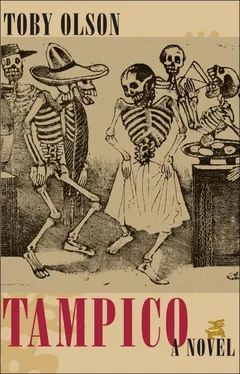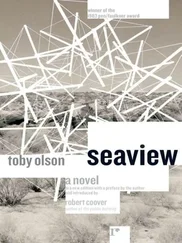They’d been at the house before Carlos had arrived, and that wasn’t coincidence, since they had been there even earlier, scavenging. And Manuel had been there, too, many years before, when he was a child and his own father had taken him there and they had sat on horses and looked the place over. It was empty then and starting to run down, and his father had told him it might have been his, still could be, but he had been a child, anxious for other places, and the words had meant little to him, though he had not forgotten them. And then he was there again, with Ramona, to see about the cauldrons, if there was any possibility of moving them. They’d found the oil too, under the tree, but there was nothing in that for them, not until Carlos came with the surveyors, and they had hid themselves up in the foothills and seen the men arrive. Then they had begun to think there might be something, because Manuel remembered his father’s words and they were desperate now.
They had come to Tampico from the States a year ago, Manuel thinking they could make a new start there. It’s a long story, Ramona said, but in the States it was always difficult, because Manuel was a Mexican. Then in Tampico, with his gringo look, he was mistrusted. Gino huffed at the explanation, not buying it, but when she looked hard at him in a certain sadness he had bowed his head for her forgiveness, and she continued.
In Tampico there was nothing for them and they were growing old. She was fifty-nine, Manuel sixty-seven, and the money they had brought with them, a good deal of it in fact, was running out, and they were living carefully, though at a decent place still, not far from Chepa’s house, going out to find odd jobs and whatever else they could find that they could sell and thus replenish their money. They’d found deserted houses they could break into. They knew how to do that, and in some of the houses they’d found things of value. They’d found little at the house in question, but there were some things, and they had plans to return for the brass bed, and they were considering the cauldrons once again when they heard the sound of the Range Rover. “So many years,” Ramona said. “There were times we hoped for the future. But that was long ago, and now we’re old.” “Not really old,” Frank said. “Enough,” Ramona replied.
So they had watched the men, vague ideas blinking in their minds, and when Alma had come and the men had bathed in the cauldrons and then set off, they had returned to their own house and quickly loaded up their horses, then had followed their trail, and in a while there had seemed no way in which they could stop doing that. They had entered places that were infected with pollen, and they realized there was no turning back, not alone, and that those they followed might now become their saviors if Ramona’s asthma and allergies continued to affect her. When Carlos watched them through the glasses they were attempting a desperate assault. They had lost them, then had found them again, spied through their own glasses. But in the arroyo the pollen was thick, and halfway up Ramona had her attack, and their assault had turned away from aggression and into a search for help. “We were about halfway up,” Manuel mumbled, and Carlos looked over at him, vaguely remembering his passivity. “I’m too fucking old for this kind of thing,” Ramona said, and Manuel dropped his head to his chest, nodding deeply in agreement. “What about the fire?” Gino said, and Ramona looked at him in desperation once again. “Lord, father. I must have been someone else back then. Remember the jewel in my tongue? Someone else entirely.” “Are you married?” Gino asked, gently now. “Yes,” she said. “And he has been my savior.” “Coincidence,” John said. “There’s no accounting for it.”
They reached the valley floor, then found themselves in trees, taller and more shade-laden than they had pictured from above. There were animal trails, winding off in various directions through grasses and hard-packed dirt, and the one Alma led them down seemed no different from the rest. It too turned and twisted, and branches brushed against their legs as their horses followed the rumps of the ones ahead, in single file now. Ramona coughed and sputtered and lifted her inhaler to her mouth, and Gino turned in his saddle to look back at her. Carlos was in constant awareness of his father, and Gino’s turning seemed a presage of his own, should he too turn to face into that past, strangely erased by the present.
They came into small clearings, and sun warmed their heads and shoulders, and there were places where the trees thinned and they could see ahead for a good distance. It was close to ten by the time they saw through to where the trees ended, and when they reached that place and forest was behind them, they were standing at the brink of an open plain, a shallow bowl of breeze-wavering grasses, at the far edge of which rose up the first stones and rocks of the mossy foothills, and they could see a causeway where the foothills started, a broad trail that ascended gracefully, up through a rocky passage toward the domed mountain. Heavy trees hung languidly in mist, and the trail disappeared in mist before it reached the top, but there was sun above the plain, and Carlos thought the mist was really low clouds and that they’d come to brighter air above.
Mountain flowers grew where veins of moss joined the rocks like green mortar at their creases. There were bees in the flowers at head level, and Ramona was sneezing occasionally. The trail was broad enough to ride two abreast, and Gino was beside her, attentive in his sombrero. He leaned into her, talking. Carlos thought, all these years, but he had not turned to his father yet for such conversation. They rode beside each other, the donkeys hitched to that line behind them. The horses’ heads were up, scenting, their ears rotated to catch the breeze. They seemed expectant, legs lifting, hooves digging into the trail’s hard dirt with increasing energy, which the men lacked. John nodded off in his saddle, and Larry leaned over to touch and awaken him from time to time, to steady him, though he too was fighting sleep, and Frank rode singly ahead of them, constantly shifting his weight on the blanket and rotating a stiff shoulder. The soothing heat of the pool and the redemption of night’s sleep had worn away now, and they were dead tired in their bones, though the sun they could see through mountain mist above had not yet reached its zenith.
Then the trail climbed out of the bordering rocks and they entered onto a plateau that was a meadow, and they could see ahead, a quarter mile off, where the mountain rose up again in oak and ironwood, thick grasses at their bases, and honeysuckle too, and mountain aspen, white trunks like marble pillars in the greens and russets, and above that the misty blanket, lower now and impenetrable, a cloud layer, though luminous as sun filtered through it. Then they were crossing the meadow.
“Do you ever think of your mother?”
His mother had worked her fingers to the bone. He had thought of that sometimes, the actual words, because the garment factory in Matamoros had been a sweatshop and she had come home bleeding at her fingertips and once her finger had been caught in a machine in sewing, and he had seen the actual bone. His father had been younger than he himself was now, desperate in his gringo paleness, and while his mother had gotten a light-skinned Mexican for herself and a charming and handsome one, there’d been only a dull turmoil below that skin, and she was as poor and dulled in spirit as she had been before, once she had gotten him and then a child too, himself back then as he thought this, to press her down harder in the grinding.
Читать дальше












